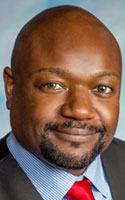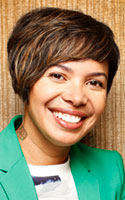Inclusion, access and equity: priorities for Excellus BCBS, officials say
By John Addyman

“For us, diversity and inclusion are not just the right thing to do, they are a business priority,” according to Joseph Searles, the Excellus BlueCross BlueShield corporate diversity relations director. “They drive the incubator for innovation, allow us to better serve our customers and achieve better business results.”
Searles, a 20-year veteran of the company, has been involved in diversity efforts in the last 10 years, which he describes as a “real journey with the organization.”
He feels the advantages of a diverse workforce makes sense: “People and businesses want to do business with an organization that they can see themselves in, or where they feel valued. People want to do business with an organization they feel values their business. There’s a community steward perspective to this.”
Working through some of life’s difficulties are so much easier when the people trying to help you look and sound like you. Excellus provides services to maintain health care for a widely diverse population in the area.
To get an appreciation for what the company contends with every day, just go to the bottom of the first page of its website, www.excellusbcbs.com, and look at the list of languages supported: English, French, Russian, Greek, Italian, Polish, Tagalog (Philippines), Yiddish, Italian, Spanish, Chinese, Haitian Creole, Korean, Bengali, Arabic, Urdu and Albanian. The company’s translation services even go well beyond those languages for those who need help.
You have to figure a company that works with that many cultures and languages in this area has to be diverse to be successful. But on top of that, it has to be inclusive.
“Employees perform better when they feel valued and have a voice in the process,” said Searles. “For us, that is the real business case for diversity and inclusion, and it makes us an employer of choice, able to attract and retain the most talented people. To achieve that, it’s real important to have commitment from the top down and the bottom up — our CEO is very serious about this work.”
Sady Fischer is the corporate director of diversity, equity and inclusion at Excellus. “I oversee everything that covers our policies, our high rate of retention, and looking at our culture as an organization. In 2019 we started truly investing in diversity, equity and inclusion by helping our employees understand what that meant to them, and how those things applied to their work. We rolled out what we called an IDEA mindset of inclusion, diversity, equity and access.
“It is the responsibility for all employees to ask, to look at things in terms of, are they being inclusive? What more can they do in terms of inclusion around a process or their meetings? Who was missing around the table? Did they need a different perspective? A certain background? Community representation?
“Equity is about leveling the playing field. What barriers were in place and what could we do to help eliminate some of those. Access is acknowledging people’s unique needs, looking at our employees and our customers: how do we fill their needs to provide better access for them to our services?”
Training the leadership

Getting the IDEA program started and earning corporate buy-in from the top required a shift in thinking for many managers and executives. Like many companies, Excellus had a white male way of looking at things.
To turn that around, Fischer and Searles began a training program for executives that required them to read “Waking Up White: And Finding Myself in the Story of Race” by Debby Irving, a book about white privilege and implicit bias.
Jim Redmond, who is the Excellus regional vice president of communications and community investment, provided a simple example.
“The training is to look beyond the obvious,” he said. “For many people, when you think of a pilot of an airplane, your obvious thoughts, what you picture, is an older white male with white or gray hair, like US Airways pilot Chesley ‘Sully’ Sullenberger who landed his plane in the Hudson River.
“But the pilot could be a woman, a veteran, someone of color or a combination. The book gets you to look beyond what your obvious thoughts are.”
And that’s where the Excellus journey began, Searles said. “We didn’t come out of the gate talking about unconscious bias. What we have done is to evolve the organization to understand diversity and inclusion and why they’re important to the business.”
“Excellus is here to improve the health of our members and their communities. When you look at the business case and wonder why you want diversity and inclusion and access, you’re asking how you’re serving your members, how you’re serving supporter groups, and how you’re treating your employees.”
“Reception to our programs has been really positive,” said Fischer, “especially in light of the racial equity issues in Rochester right now.
Employees of all backgrounds have been ready for more information, realizing they haven’t quite been aware of all the injustices, especially about structural racism. We’re getting more requests for information. We’re organizing book clubs. We’re doing forums with open dialogue. We’re asking our leaders to check in with their employees to see how they’re doing in these times. We’re asking leaders to ask their people ‘How are you doing? What is it you need?’ We’ve also been focusing a lot on self-care.”
She said Excellus has a 21-day racial equity challenge program covering issues of white privilege, microaggression and structural racism, and encourages all employees to participate. Next year, all employees will be required to go through annual training on diversity, inclusion and equity concerns.
Not everyone is a fan of this kind of training. In September, President Donald Trump signed an executive order banning employee diversity and inclusion training for federal agencies, contractors, grant recipients and the military that is “rooted in the pernicious and false belief that America is an irredeemably racist and sexist country.” The order targets “divisive and harmful sex- and race-based ideologies…(and) white privilege diversity training.”
“The executive order does not change our company’s commitment to diversity, inclusion, equity and access, nor the extensive trainings and programs we maintain to support this important work,” said Redmond. “As to whether we are required to modify our training materials, we are evaluating the executive order, although we anticipate little impact on our current training modules.”

